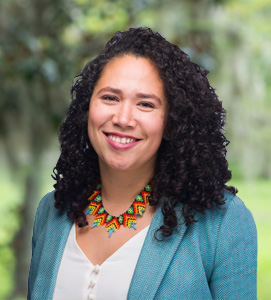Ana Maria Porras, Ph.D., an assistant professor in the J. Crayton Pruitt Family Department of Biomedical Engineering at the University of Florida, has been awarded the NIH Maximizing Investigators’ Research Award (MIRA) to advance her research into how the human microbiome interacts with and influences tissue health. This prestigious R35 award, totaling $1.8 million provides sustained funding for Porras to explore how beneficial microorganisms in the body impact the extracellular matrix (ECM), a structural network essential for tissue stability and function.
The MIRA mechanism, offered through the National Institute of General Medical Sciences (NIGMS), is well-suited to support Porras’s creative and interdisciplinary approach. “This award provides the flexibility and resources needed to take risks and explore novel aspects of human-microbiome interactions,” she noted. “The MIRA will help me establish my independence, produce impactful publications, and mentor the next generation of engineers and scientists.”
Porras leads the Tissue-Microbe Interactions Laboratory, where her team designs advanced biomaterials-based platforms and ex vivo models that replicate the properties of healthy and diseased human tissues. “In our lab, we’re developing tools to understand the mechanisms by which microorganisms help regulate tissue health,” Porras said. “We hypothesize that the microbiome’s impact on ECM structure plays a crucial role in tissue function and disease, potentially providing new avenues for diagnostics and therapies.”
Her research will investigate three critical areas: identifying environmental factors that enable bacterial degradation of ECM, uncovering the microbial enzymes involved in this process, and analyzing how ECM remodeling affects immune cell behavior and inflammation. The study will initially focus on studying gut and vaginal bacteria, using innovative platforms that mimic the ECM and enable precise examination of microbiome-ECM interactions.
A strong advocate for broadening access to scientific education, Porras is committed to science outreach and multilingual engagement. She has pioneered creative science communication methods, using crocheted microbiology art and bilingual content to reach audiences across the U.S. and Latin America. Her lab has also partnered with local organizations in Florida, co-organizing bilingual workshops to inspire Latinx middle- and high-school students to pursue engineering. “Training students in my lab involves not only scientific rigor but also opportunities for public engagement, emphasizing the importance of accessible science communication,” Porras explained.
With expertise spanning biomaterials, ECM biology, and microbiome science, Porras’s lab is poised to uncover critical insights into the microbiome’s role in tissue health and dysfunction. Her research could pave the way for new therapeutic strategies that leverage the microbiome to support tissue resilience and prevent disease.

